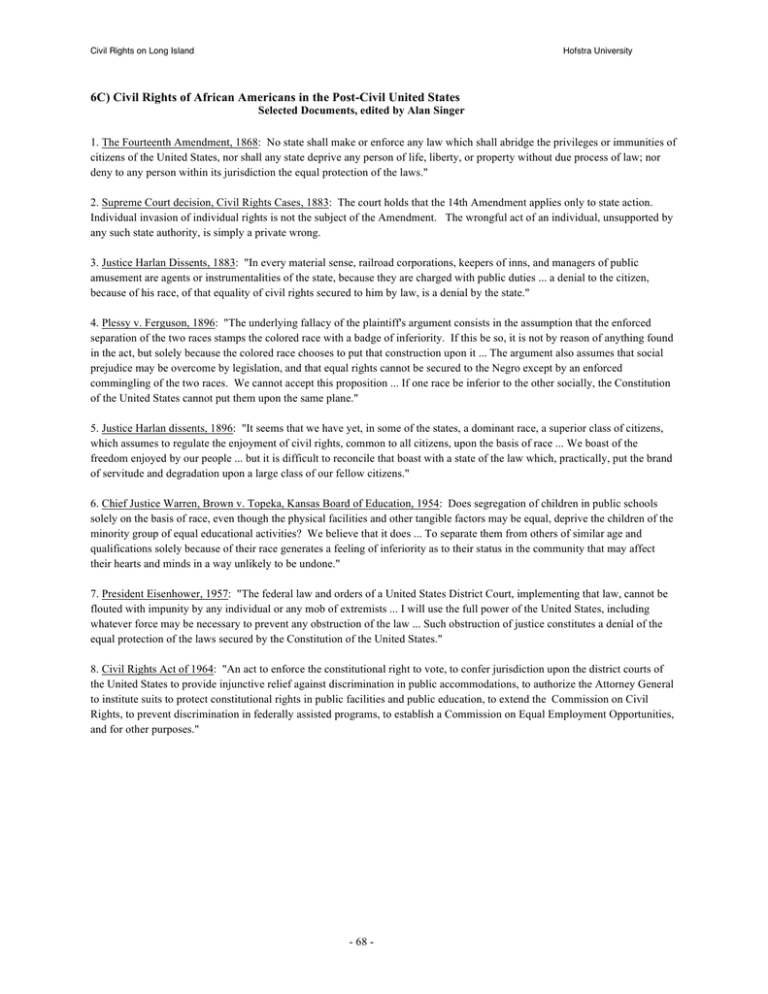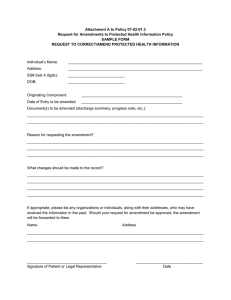6C) Civil Rights of African Americans in the Post-Civil United...
advertisement

Civil Rights on Long Island Hofstra University 6C) Civil Rights of African Americans in the Post-Civil United States Selected Documents, edited by Alan Singer 1. The Fourteenth Amendment, 1868: No state shall make or enforce any law which shall abridge the privileges or immunities of citizens of the United States, nor shall any state deprive any person of life, liberty, or property without due process of law; nor deny to any person within its jurisdiction the equal protection of the laws." 2. Supreme Court decision, Civil Rights Cases, 1883: The court holds that the 14th Amendment applies only to state action. Individual invasion of individual rights is not the subject of the Amendment. The wrongful act of an individual, unsupported by any such state authority, is simply a private wrong. 3. Justice Harlan Dissents, 1883: "In every material sense, railroad corporations, keepers of inns, and managers of public amusement are agents or instrumentalities of the state, because they are charged with public duties ... a denial to the citizen, because of his race, of that equality of civil rights secured to him by law, is a denial by the state." 4. Plessy v. Ferguson, 1896: "The underlying fallacy of the plaintiff's argument consists in the assumption that the enforced separation of the two races stamps the colored race with a badge of inferiority. If this be so, it is not by reason of anything found in the act, but solely because the colored race chooses to put that construction upon it ... The argument also assumes that social prejudice may be overcome by legislation, and that equal rights cannot be secured to the Negro except by an enforced commingling of the two races. We cannot accept this proposition ... If one race be inferior to the other socially, the Constitution of the United States cannot put them upon the same plane." 5. Justice Harlan dissents, 1896: "It seems that we have yet, in some of the states, a dominant race, a superior class of citizens, which assumes to regulate the enjoyment of civil rights, common to all citizens, upon the basis of race ... We boast of the freedom enjoyed by our people ... but it is difficult to reconcile that boast with a state of the law which, practically, put the brand of servitude and degradation upon a large class of our fellow citizens." 6. Chief Justice Warren, Brown v. Topeka, Kansas Board of Education, 1954: Does segregation of children in public schools solely on the basis of race, even though the physical facilities and other tangible factors may be equal, deprive the children of the minority group of equal educational activities? We believe that it does ... To separate them from others of similar age and qualifications solely because of their race generates a feeling of inferiority as to their status in the community that may affect their hearts and minds in a way unlikely to be undone." 7. President Eisenhower, 1957: "The federal law and orders of a United States District Court, implementing that law, cannot be flouted with impunity by any individual or any mob of extremists ... I will use the full power of the United States, including whatever force may be necessary to prevent any obstruction of the law ... Such obstruction of justice constitutes a denial of the equal protection of the laws secured by the Constitution of the United States." 8. Civil Rights Act of 1964: "An act to enforce the constitutional right to vote, to confer jurisdiction upon the district courts of the United States to provide injunctive relief against discrimination in public accommodations, to authorize the Attorney General to institute suits to protect constitutional rights in public facilities and public education, to extend the Commission on Civil Rights, to prevent discrimination in federally assisted programs, to establish a Commission on Equal Employment Opportunities, and for other purposes." - 68 -


